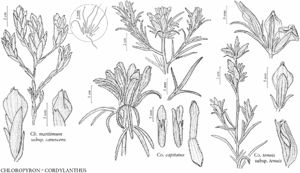familyOrobanchaceae
genusCordylanthus
speciesCordylanthus tenuis
subspeciesCordylanthus tenuis subsp. tenuis
Difference between revisions of "Cordylanthus tenuis subsp. tenuis"
Selected by author to be illustratedEndemic
Synonyms: Cordylanthus bolanderi (A. Gray) Pennell C. pilosus subsp. bolanderi (A. Gray) Munz C. pilosus var. bolanderi A. Gray
FNA>Volume Importer |
FNA>Volume Importer |
||
| Line 14: | Line 14: | ||
|name=Cordylanthus bolanderi | |name=Cordylanthus bolanderi | ||
|authority=(A. Gray) Pennell | |authority=(A. Gray) Pennell | ||
| − | }}{{Treatment/ID/Synonym | + | }} {{Treatment/ID/Synonym |
|name=C. pilosus subsp. bolanderi | |name=C. pilosus subsp. bolanderi | ||
|authority=(A. Gray) Munz | |authority=(A. Gray) Munz | ||
| − | }}{{Treatment/ID/Synonym | + | }} {{Treatment/ID/Synonym |
|name=C. pilosus var. bolanderi | |name=C. pilosus var. bolanderi | ||
|authority=A. Gray | |authority=A. Gray | ||
| Line 35: | Line 35: | ||
|elevation=300–2600 m. | |elevation=300–2600 m. | ||
|distribution=Calif. | |distribution=Calif. | ||
| − | |discussion=<p>Subspecies tenuis grows in the foothills of the Sierra Nevada with a disjunct population in the Klamath Range. Some plants from the central Klamath Range are similar to subsp. viscidus, which has three-lobed inflorescence bracts.</p> | + | |discussion=<p>Subspecies tenuis grows in the foothills of the Sierra <i>Nevada</i> with a disjunct population in the Klamath Range. Some plants from the central Klamath Range are similar to <i></i>subsp.<i> viscidus</i>, which has three-lobed inflorescence bracts.</p> |
|tables= | |tables= | ||
|references= | |references= | ||
| Line 59: | Line 59: | ||
|publication year= | |publication year= | ||
|special status=Selected by author to be illustrated;Endemic | |special status=Selected by author to be illustrated;Endemic | ||
| − | |source xml=https://jpend@bitbucket.org/aafc-mbb/fna-data-curation.git/src/ | + | |source xml=https://jpend@bitbucket.org/aafc-mbb/fna-data-curation.git/src/8f726806613d60c220dc4493de13607dd3150896/coarse_grained_fna_xml/V17/V17_1221.xml |
|genus=Cordylanthus | |genus=Cordylanthus | ||
|species=Cordylanthus tenuis | |species=Cordylanthus tenuis | ||
Revision as of 14:57, 18 September 2019
Stems puberulent to glandular-pubescent proximally. Leaves green, linear, entire. Inflorescences 1–3-flowered; bracts green, entire, hirsute with a few long hairs near margins. Flowers: corolla 10–20 mm.
Phenology: Flowering Jul–Sep.
Habitat: Openings in conifer woodlands.
Elevation: 300–2600 m.
Discussion
Subspecies tenuis grows in the foothills of the Sierra Nevada with a disjunct population in the Klamath Range. Some plants from the central Klamath Range are similar to subsp. viscidus, which has three-lobed inflorescence bracts.
Selected References
None.
Lower Taxa
None.
